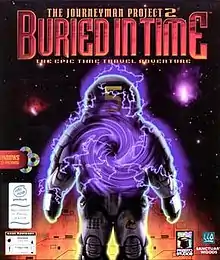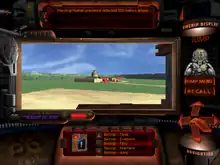The Journeyman Project 2: Buried in Time
The Journeyman Project 2: Buried in Time is a computer game developed by Presto Studios and is the second game in the Journeyman Project series of computer adventure games.
| The Journeyman Project 2: Buried in Time | |
|---|---|
 | |
| Developer(s) | Presto Studios |
| Publisher(s) | Sanctuary Woods |
| Director(s) | Phil Saunders |
| Producer(s) | Michel Kripalani Farshid Almassizahed |
| Designer(s) | Phil Saunders Victor Navone |
| Programmer(s) | Greg Uhler |
| Artist(s) | E.J. Dixon III Jose Albanil |
| Writer(s) | David Flanagan Phil Saunders Michel Kripalani |
| Composer(s) | Bob Stewart |
| Series | The Journeyman Project |
| Platform(s) | Windows, Mac OS |
| Release | 1995 |
| Genre(s) | Adventure game |
| Mode(s) | Single player |
Published in 1995 by Sanctuary Woods, Buried in Time was a radical change from the original. It established Agent 5 (the player's character) as Gage Blackwood, which in the original Journeyman Project lacked basic personality features and even a name. It also featured greatly improved graphics and animation as well as many live-action sequences. The PC version was programmed entirely in C++ for improved performance. A PlayStation version was also prototyped, but was never released.
Story

As the story begins in the year 2318, six months after the events of the first game, Gage Blackwood (once again controlled by the player) is visited by himself from ten years in the future. Someone has framed the future Gage for tampering with historical artifacts and it is up to the past Gage to visit the past and find evidence to clear his name. Meanwhile, the Symbiotry of Peaceful Beings is deliberating on Earth's monopoly on time travel technology and this latest trial threatens to close down the Temporal Security Agency (TSA). After joining up with an artificial intelligence being named Arthur, Gage visits locations such as the workshop of Leonardo da Vinci, the ending of the Siege of Chateau Gaillard, and the Mayan temple of Chichen Itza and eventually find the culprit, Michelle Visard, who is another TSA agent. Gage is kidnapped by her and taken to an old missile silo, where Arthur sacrifices himself to force Michelle to jump to another time, and allow Gage to continue his mission. Gage eventually uncovers that another alien race, the Krynn, are behind the crimes and the framing of Gage, to further their own interests. Gage is able to stop the Krynn and save his future self, and is then mind-wiped and sent back to his own time.
Publishing
Buried in Time was published by Sanctuary Woods upon its original release. However, Sanctuary Woods soon went out of business, and Presto Studios self-published the game until Red Orb Entertainment picked up the distribution rights in 1998. Red Orb published the game until their demise in 1999.
Releases and bug fixes
Sales of Buried in Time surpassed 200,000 units by July 1996, while those of the overall Journeyman Project series had reached roughly 500,000 units by that date.[1] Buried in Time ultimately sold 225,000 units,[2] on a budget of "almost $500,000", according to Michel Kripalani.[3]
The initial 1.0 release of Buried in Time included a notable glitch near the end of the game that prevented the player from getting a perfect score. This bug and other problems related to running under Windows 95 were solved in a version 1.1 patch.
When the game was released as part of The Journeyman Project Trilogy box set, Buried in Time was plagued by a manufacturing error that affected many of the box sets. The disc labeled as disc 2 actually contained the data for disc 3, making the game essentially unplayable.
The game was rereleased through Good Old Games on June 29, 2010.[4]
Reception
| Publication | Score |
|---|---|
| Computer Gaming World | |
| Next Generation | |
| PC Gamer (US) | 80%[8] |
| Computer Game Review | 74/90/91[9] |
| PC Magazine | |
| MacUser | |
| PC Games | A[12] |
| Publication | Award |
|---|---|
| PC Games | Game of the Month[12] |
The reaction to the game was mostly positive. Reviewing the Macintosh version, a critic for Next Generation called the game a "hipper, vastly larger sequel ... whose completion feels a little like finishing a long novel that actually makes you think". Particularly noting the visually stunning scenes and non-distracting edutainment element of the "Arthur" chip, he gave it three out of five stars.[6] Their review of the Windows version went up to four out of five stars, despite the assessment that "Buried in Time is another graphic adventure that concentrates on spectacular graphics while compromising gameplay". The reviewer elaborated that the need to frequently look in every direction, coupled with the long load times, slows the gameplay, but that the storyline and graphics make the game worthwhile despite this.[7] Just Adventure gave the game an "A+", saying "...this is one of the best games I’ve ever played. It impressed me from start to finish".[13] Programmer in Black, while having a few gripes about the scoring system, finished his review with "I recommend this (game) highly".[14]
Entertainment Weekly gave the game a B.[15]
In a retrospective review, Jack Allin of Adventure Gamers criticized the tiny viewscreen and elaborate, unwieldy interface, but praised the engaging and believable game world, detailed graphics, and the addition of animation when moving between nodes. He concluded that "unlike the previous game, Buried in Time should have a broader appeal than just science-fiction fans. There's humour, there's history, and a healthy dose of puzzle adventure that moves the franchise forward appreciably, if you can dance around the awkward missteps along the way".[16]
In 2011, Adventure Gamers named Buried in Time the 89th-best adventure game ever released.[17]
MacUser named Buried in Time a finalist for its award for the best strategy game of 1995.[18]
References
- "Broderbund Software Strengthens Its Growing Entertainment Studio With The Journeyman Project 3" (Press release). Novato, California: Broderbund. July 8, 1996. Archived from the original on October 19, 1996.
- Stephens, AnnaMaria (May 2009). "Features; Journeyman". @UCSD. 6 (2). Archived from the original on June 13, 2010.
- "GA-Source - Interviews - Michel Kripalani, President and CEO of Presto Studios". www.ga-source.com. Archived from the original on 18 August 2000. Retrieved 12 January 2022.
- "Journeyman Project 2: Buried in Time, The". GOG.com. Retrieved 2018-05-23.
- Ardai, Charles (November 1995). "The Mysts of Time". Computer Gaming World. No. 136. pp. 120, 122, 124.
- "Buried in Time: The Journeyman Project 2". Next Generation. No. 10. Imagine Media. October 1995. pp. 119, 121.
- "Buried in Time: The Journeyman Project 2". Next Generation. No. 13. Imagine Media. January 1996. p. 159.
- Vaughn, Todd (October 1995). "Buried in Time". PC Gamer US. Archived from the original on February 29, 2000.
- Snyder, Frank; Chapman, Ted; Kaiafas, Tasos (September 1995). "Six Hours Under". Computer Game Review. Archived from the original on December 21, 1996.
- Rubenking, Neil J. "Spotlight on Adventure: Buried in Time". PC Magazine. Archived from the original on January 8, 2001.
- Levitus, Bob (January 1996). "The Game Room". MacUser. Archived from the original on April 25, 2001.
- Brenesal, Barry (October 1995). "The Journeyman Project 2: Buried in Time". PC Games. Archived from the original on October 18, 1996.
- "Journeyman Project 2: Buried in Time Review". justadventure.com. Archived from the original on 2006-03-17. Retrieved 2006-04-28.
- "The Journeyman Project 2: Buried in Time; PIB PC Game Review". pibweb.com. Archived from the original on 2006-04-28. Retrieved 2006-04-28.
- "The Journeyman Project 2: Buried in Time". Entertainment Weekly.
- Allin, Jack (July 15, 2004). "Adventure Gamers: Journeyman Project 2: Buried in Time". adventuregamers.com. Archived from the original on 2006-02-26. Retrieved 2006-05-19.
- AG Staff (December 30, 2011). "Top 100 All-Time Adventure Games". Adventure Gamers. Archived from the original on June 4, 2012.
- Myslewski, Rik; Editors of MacUser (March 1996). "The Eleventh Annual Editors' Choice Awards". MacUser. 12 (3): 85–91.
{{cite journal}}:|author2=has generic name (help) - "Pyramid: Pyramid Pick: Buried in Time: The Journeyman Project II".